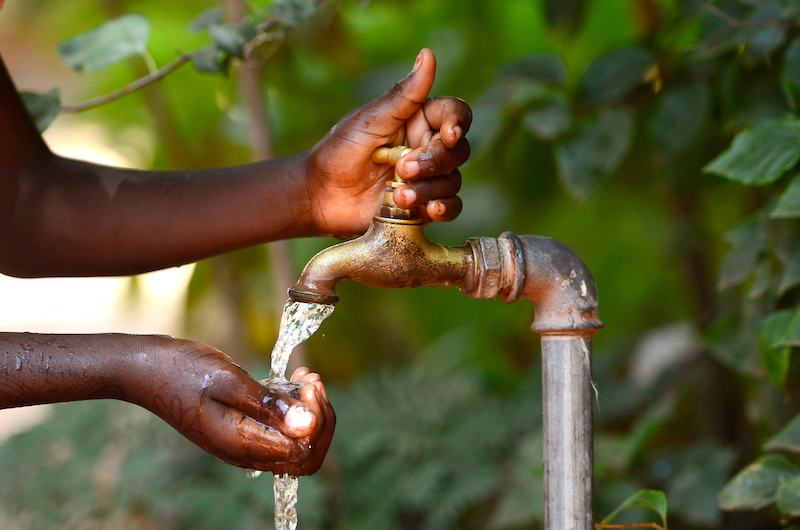Africa’s water security
March 2022: Despite global Sustainable Development Goals and commitments made in 2015, just 29 African nations have made some progress over the past three to five years, while 25 have made none, according to the UN’s first-ever assessment of water security in Africa.

Published on the eve of World Water Day (March 22) by UN University’s Canadian-based Institute for Water Environment and Health (UNU-INWEH), the assessment employed ten indicators to quantify water security in Africa’s 54 countries.
Except for Egypt, all country scores are below 70 out of 100. Only 13 countries reached a modest level of water security in recent years, and over a third are deemed to have levels of water security below the threshold of 45.
Together, the 19 countries below the threshold are home to half a billion people.
Egypt, Botswana, Gabon, Mauritius and Tunisia are Africa’s top five most water-secure countries in Africa, yet with only modest absolute levels of water security achieved.
Somalia, Chad and Niger appear to be the least water-secure countries on the continent.
There has been little progress in national water security of most African states over the past three to five years, the report finds. The number of countries that made some progress (29) is close to the number of those that made none (25).
Call for global standards
To compare Africa’s situation globally, the authors call for global standards for water security measurement data and assessment.
The assessment tool is still a work in progress, Dr Smakhtin notes, adding that UNU-INWEH’s goal is to have by 2025 – five years before the deadline for meeting the UN’s Agenda 2030 – “an improved, influential and nationally-owned tool” for assessing water security in all African countries.
However, according to research by WaterAid and the British Geological Survey (BGS), there is enough groundwater under the continent of Africa for most countries to survive at least five years of drought and some for more than 50 years.
But gross underinvestment in services to get the water out of the ground and to those who need it most and untapped or poorly managed resources means millions of people don’t have enough safe, clean water to meet their daily needs, let alone face the impacts of the climate crisis, WaterAid and BGS warn.
Groundwater – which exists almost everywhere underground, in gaps within soil, sand and rock – has the potential to save hundreds of thousands of lives and be the world’s insurance policy against climate change, the organisations assert.
It could help communities cope not only with slow-onset impacts like drought and irregular rainfall, but also provide resilience to rapid onset impacts like floods by ensuring safe water is available for all, including in schools and hospitals, according to the report.
Tim Wainwright, Chief Executive of WaterAid in the UK, says: “Our findings debunk the myth that Africa is running out of water. But the tragedy is that millions of people on the continent still do not have enough clean water to drink.
“There are vast reserves of water right under people’s feet, many of which are replenished every year by rainfall and other surface water, but they can’t access it because services are chronically underfunded. Tapping into groundwater would ensure millions have access to safe, clean water no matter what the climate crisis throws at them.”
Nature's reservoir
Professor Alan MacDonald, BGS Groundwater Resilience Lead, adds: “Groundwater is nature’s water reservoir, and a key resource to help the world adapt to climate change. It’s widely available, controlled by natural variation in geology, but is out of sight beneath our feet.
“To unlock the great potential of groundwater, we need the right investment in expertise to map groundwater, drill sustainable wells and find ways to maintain and manage water resources and services.”
The report also explains that while groundwater in sub-Saharan Africa is largely underused, in other parts of the world – mainly in south Asia – overuse is rife. This, along with a lack of regulation, insufficient expertise and investment, often leads to mismanagement, contamination and pollution – with potentially devastating consequences.
The report, Groundwater: The world’s neglected defence against climate change, emphasises the need to increase water and sanitation financing for marginalised communities through a fixed percentage of annual government budgets and increased international donor and private sector investment.
It also stresses the importance of agreeing at COP 27 that investment in responsible groundwater development and the knowledge, expertise, finance and institutional support this requires, is key to securing life-saving sustainable and safe water and sanitation for communities living on the frontline of the climate crisis.
One of the ways to achieve this is to invest in better mapping and monitoring of the Earth’s subsurface to determine where good-quality groundwater is not only available but also extractable in a sustainable and economical way, to unlock its full potential, say WaterAid and BGS.
Image: borgogniels/123rf